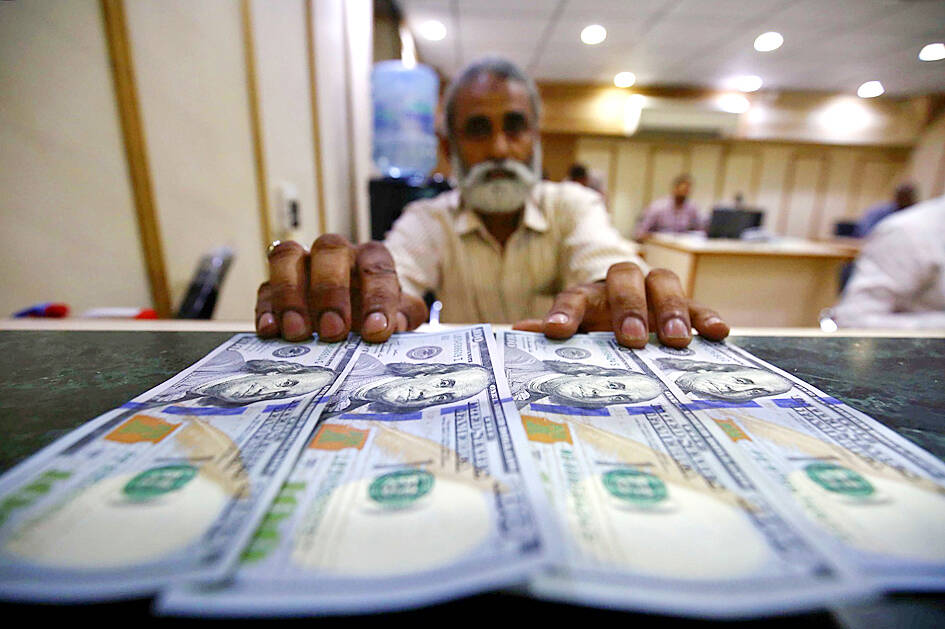The US dollar on Friday rose against the euro and sterling, to reach its biggest weekly gain since February, as investors shifted to safe havens after consumer sentiment data fueled concern about the US debt ceiling and monetary policy.
A University of Michigan survey on Friday showed that May US consumer sentiment slumped to a six-month low on worries that a political dispute over raising the federal government’s borrowing cap could trigger a recession.
Consumers’ long-term inflation expectations rose to their highest since 2011. That could influence the US Federal Reserve, which signaled last week that it could pause its interest-rate hikes.

Photo: EPA-EFE
“Rate differentials are continuing to tilt in the dollar’s favor,” said Karl Schamotta, chief market strategist of Corpay in Toronto. “The surprises in the University of Michigan consumer sentiment survey are painting sort of a stagflationary picture for the US economy, and one that could justify another rate hike at the June Fed meeting, but certainly will diminish odds of rate cuts in the latter half of the year.”
Data also showed US consumer price index inflation cooling to 4.9 percent year-on-year last month. Moreover, weekly jobless claims rose more than expected, but the labor market remains tight, with 1.6 job openings for every unemployed person in March, well above the 1-1.2 range consistent with a market not generating too much inflation.
US Fed Governor Michelle Bowman said that the central bank would probably need to raise rates further if inflation stays high.
The pound fell 0.5 percent to US$1.2448, while the euro weakened 0.59 percent to US$1.0853, a day after falling to a one-month low.
That left the dollar index up 0.63 percent at 102.71, notching a weekly gain of 1.47 percent — its biggest weekly rise since February.
The New Taiwan dollar fell against the US dollar, losing NT$0.020 to close at NT$30.758, down 0.38 percent from NT$30.641 last week.
Joe Manimbo, senior market analyst at Convera, said that elevated US inflation spurred some skepticism about the Fed’s year-end rate cuts, and that the view that other central banks might be closer to pausing rate hikes as well has weighed on European currencies.
“Dollar gains this week have been multidimensional. The buck has served as a safe harbor from worries about a weak Chinese economy and volatility on Wall Street,” Manimbo wrote. “While stronger, it’s too soon to tell whether the dollar’s run of weakness has turned the corner. Markets would need to take rate cuts off the table to lend meaningful upside traction to the greenback.”
Additional reporting by staff writer, with CNA

Intel Corp chief executive officer Lip-Bu Tan (陳立武) is expected to meet with Taiwanese suppliers next month in conjunction with the opening of the Computex Taipei trade show, supply chain sources said on Monday. The visit, the first for Tan to Taiwan since assuming his new post last month, would be aimed at enhancing Intel’s ties with suppliers in Taiwan as he attempts to help turn around the struggling US chipmaker, the sources said. Tan is to hold a banquet to celebrate Intel’s 40-year presence in Taiwan before Computex opens on May 20 and invite dozens of Taiwanese suppliers to exchange views

Application-specific integrated circuit designer Faraday Technology Corp (智原) yesterday said that although revenue this quarter would decline 30 percent from last quarter, it retained its full-year forecast of revenue growth of 100 percent. The company attributed the quarterly drop to a slowdown in customers’ production of chips using Faraday’s advanced packaging technology. The company is still confident about its revenue growth this year, given its strong “design-win” — or the projects it won to help customers design their chips, Faraday president Steve Wang (王國雍) told an online earnings conference. “The design-win this year is better than we expected. We believe we will win

Chizuko Kimura has become the first female sushi chef in the world to win a Michelin star, fulfilling a promise she made to her dying husband to continue his legacy. The 54-year-old Japanese chef regained the Michelin star her late husband, Shunei Kimura, won three years ago for their Sushi Shunei restaurant in Paris. For Shunei Kimura, the star was a dream come true. However, the joy was short-lived. He died from cancer just three months later in June 2022. He was 65. The following year, the restaurant in the heart of Montmartre lost its star rating. Chizuko Kimura insisted that the new star is still down

While China’s leaders use their economic and political might to fight US President Donald Trump’s trade war “to the end,” its army of social media soldiers are embarking on a more humorous campaign online. Trump’s tariff blitz has seen Washington and Beijing impose eye-watering duties on imports from the other, fanning a standoff between the economic superpowers that has sparked global recession fears and sent markets into a tailspin. Trump says his policy is a response to years of being “ripped off” by other countries and aims to bring manufacturing to the US, forcing companies to employ US workers. However, China’s online warriors